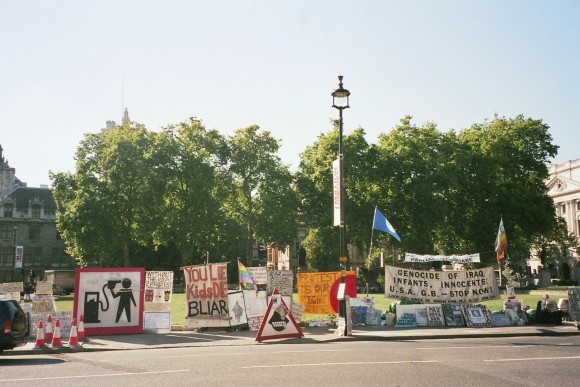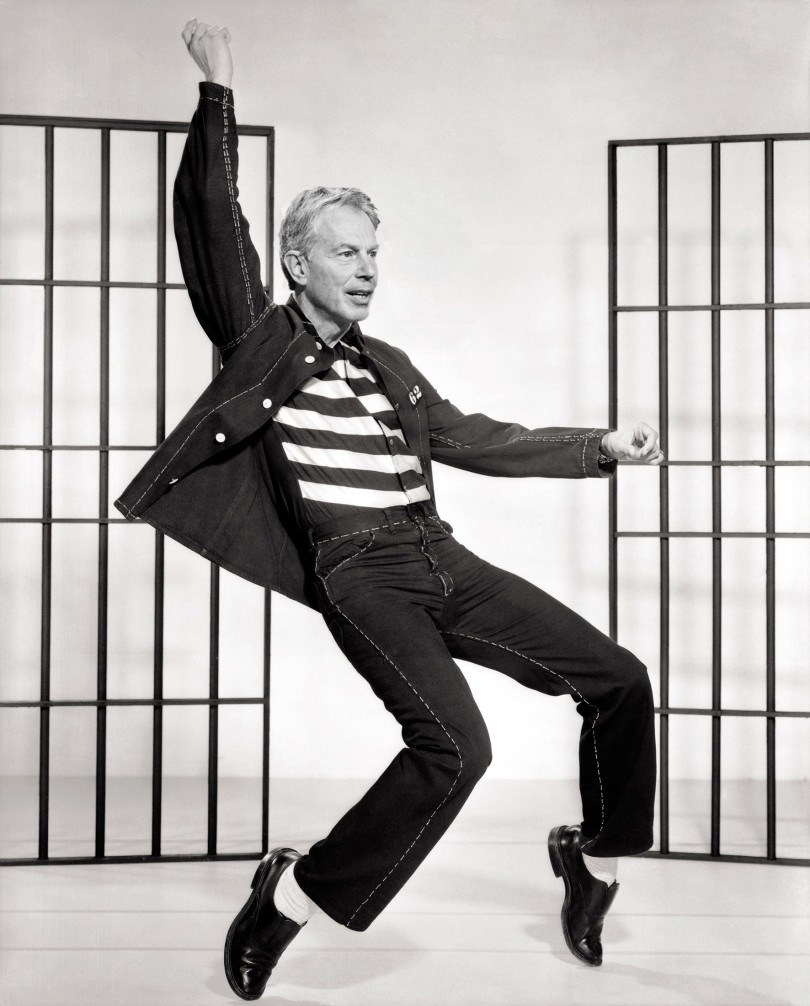aNewDomain — Former British Prime Minister Tony Blair stands accused of war crimes related to the March 2003 invasion of Iraq. The British Parliament now has everything it needs to impeach Blair, whose chief accuser is none other than his own party’s leader, Jeremy Corbyn.
 What’s going on? Here’s what you need to know about the results of the Iraq Inquiry, aka the Chilcot Inquiry, as released today.
What’s going on? Here’s what you need to know about the results of the Iraq Inquiry, aka the Chilcot Inquiry, as released today.
Named for its chairman, Sir John Chilcot, this is the UK government’s official inquiry into the UK’s policy in Iraq from 2001 to 2009, and its 2003 participation in the US-led ” invasion and full-scale occupation of a sovereign State.”
The findings are long in coming. Another former prime minister, Gordon Brown, announced the inquiry way in mid 2009. The findings, as released July 6, 2016, are readable in full, below the fold.
Why Blair is squirming
Today’s Chilcot findings were damning, especially for former Prime Minister Blair. While stopping short of calling him a liar, the findings do suggest Blair was guilty of dire judgement errors and exaggerations that, taken together, unnecessarily involved Britain in the conflict.
In short, Chilcot found that:
- The UK chose to join the U.S.-led invasion before peaceful options had been exhausted
- Blair promised U.S. President Bush that “I will be with you, whatever,” months before the war began
- Blair deliberately exaggerated the threat Iraq posed to the UK
- Iraq in fact posed no imminent threat to the UK
- The UK’s decision to invade Iraq was based on “unsatisfactory circumstances”
- U.S. Pres. Bush largely ignored UK advice on postwar planning
- Britain’s intelligence agencies produced “flawed information” before the invasion
- The UK military were ill-equipped for the war and its aftermath
- If the UK had stayed out of the war, U.S.-UK relations wouldn’t have been harmed
The report also showed Blair to be peculiarly obedient to the whims of Pres. Bush.
For instance, the findings highlight a message Blair sent to Bush eight months before the Iraq invasion of March 2003. In it, Blair flatly stated: “I will be with you, whatever.”
Yet, as the Iraq inquiry notes, the letter was penned at a time when UN weapons inspectors were still investigating whether Iraq even had weapons of mass destruction. None were ever found.
Blair also wrote that Iraqis might “feel ambivalent about being invaded,” although removing Saddam Hussein would “free up the region.”
The idea of the UK’s participating in the Iraq War was a deeply unpopular one in the UK. The decision to go to war, the inquiry says, was based primarily on intelligence that indicated that invading Iraq was a preferable alternative to waiting for Iraq to launch an attack.
But that intelligence was faulty and had been assembled in a manner to justify a political aim not a national defense expediency, according to the findings released today.
The bottom line
Essentially, the Chilcott findings released today say Blair agreed to send his country to war against a country that was not an imminent threat to his country or any other country, and at a time well before peaceful means had been exhausted for resolving the conflict.
The Chilcot committee found that the war killed at least 200,000 Iraqis, most of them civilians. During the war the U.S.-UK team took no pains to track civilian casualties. The war, the report says, killed roughly 200 British citizens — mostly soldiers; displaced more than 1 million Iraqis, and created conditions that fomented international terrorist organizations, such as ISIS.
The full 12-volume report may be reviewed and downloaded here. The Chilcot’s committee 12-page introductory statement is embedded, and readable in full and in place, below.
Sir John Chilcot Public Statement, All Findings.
Blair has been polishing his rebuttal to the committee’s report for years.
Nevertheless, his verbal defense today, with cracking voice, sounded far less persuasive than the ever-composed and cocksure Blair sounded during his 10-year tenure as PM. In his remarks, below, you’ll notice Blair even continues to hint at Saddam Hussein’s long-since disproven link to the Sept 11, 2001 terror attacks on the United States.
Being impeached by Parliament might be the least of Blair’s worries.
Unlike the U.S., the UK is a signatory to the treaty that created the International Criminal Court. It’s probably unlikely that Blair will end up at the ICC. But it’s not impossible.
Outgoing British Prime Minister David Cameron today accepted the Chilcot report and has announced that British Parliament will hold a two-day hearing next week.
As mentioned above, the current leader of Blair’s Labour Party, Jeremy Corbyn, condemned Blair with even-stronger language than Conservative Prime Minister Cameron:
The 2001 invasion of Iraq by the U.S., the UK, Australia and Poland was the first invasion and occupation of a sovereign nation by the UK since World War II. Britain’s brief invasion of Egypt in 1956 made no effort to occupy the whole country.
In 2009 Labour Prime Minister Gordon Brown, Blair’s successor, ordered an inquiry into the circumstances surrounding Britain’s entry into the Iraq War in 2001. After seven years and spending 10 million pounds, the Chilcot panel revealed today its 12-volume report about the war.
The future?
If Blair doesn’t end up at least being considered for the ICC, then the future of the ICC may be somewhat diminished. If the only international war criminals tried at the Court come solely from developing countries, dragged there by representatives from their former colonial overlords, then the ICC becomes fairly easy to dismiss for much of the developing world.
The Chilcot report completes a trend that began in the UK with the unpopularity of the Iraq War — the UK is highly unlikely to join the U.S. in any future war unless bullets are already flying.
Hillary Clinton is likely to be more hawkish than Barrack Obama, and she may find it very difficult to persuade the British to join unless the threat is obvious.
A Pres. Trump can be almost certain not to have British support for whatever saber rattling he might plan to do — invading North Korea, a Chinese War, a Cuban invasion, whatever suits his fancy, the Tommies won’t be coming along.
Whether the absence of allied support will matter to a future president will be interesting to see. As I recall, Pres. Bush couldn’t mention Britain often enough in the run-up to the Iraq War, which I assume was as important to him for domestic reasons as it was for international reasons.
Here is Sir John Chilcot unveiling the report this morning (July 6, 2016):
For aNewDomain, I’m Tom Ewing.
Image Credits:
Cover Art: Created by Tom Ewing for aNewDomain, using Metro-Goldwyn-Mayer, Inc’s collage of Elvis Presley, All Rights Reserved; Remy Steiner’s Tony Blair image: via the World Economic Forum and Wiki Commons, All Rights Reserved. Inside: Protestors outside the UK Parliament during Iraq War by David Monniaux: Own work, CC BY-SA 3.0, All Rights Reserved.













